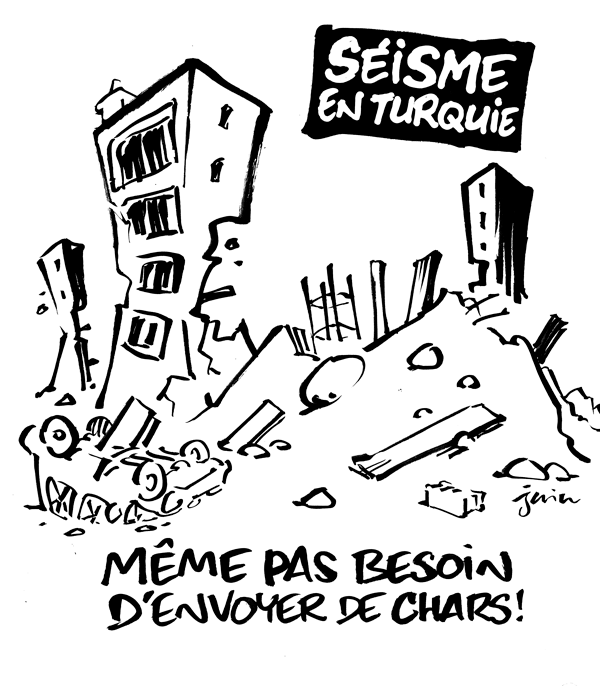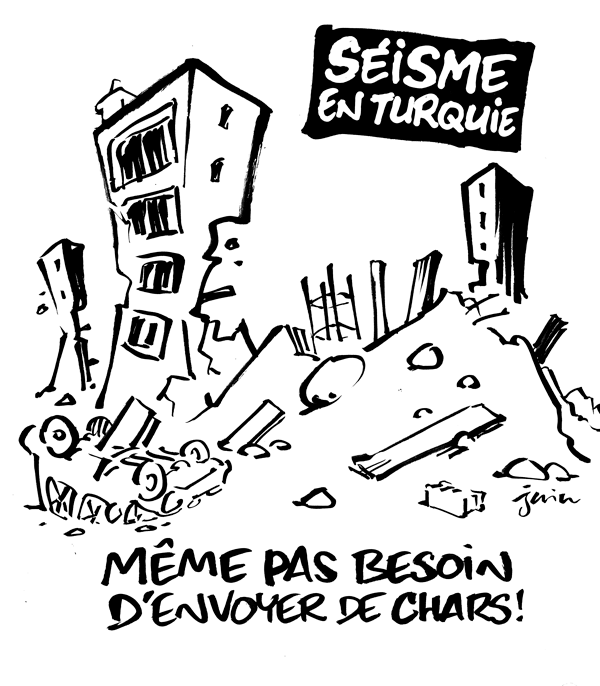LONDON: A cartoon scoffing at the deadly earthquake that has killed more than 11,000 people in Turkiye and Syria has received a severe backlash online for its insensitivity.
French satirical magazine Charlie Hebdo published a cartoon captioned “drawing of the day” and showing collapsed buildings and piles of rubble with “earthquake in Turkiye” written on top and “no need to send tanks” at the bottom, sparking outrage on social media as well as criticism from journalists.
Many deemed the cartoon “racist” and “vile,” condemning it for mocking the pain of thousands of innocent victims.
“Just vile, racist, and immensely insensitive,” tweeted Islamophobia scholar Khaled Beydoun.
“It is really disgusting to make fun of the suffering of others and far from the ethics of journalism, assuming it sticks to it, and I doubt it,” wrote Abdulla Al-Amadi in a tweet.
Lebanese journalist Giselle Khoury described the cartoon as “shameful,” demanding the magazine explain how this constituted “freedom of expression.”
Honteux. Expliquez moi la liberté d’expression s’il vous plaît pic.twitter.com/YCy0pvf4U4
— Giselle Khoury (@gizou10) February 7, 2023
Rana Abi Jomaa, also a Lebanese journalist, wrote that “there are no limits to Charlie Hebdo’s racism,” wondering “who would defend this abhorrent satirical French magazine after today?”
“Charlie Hebdo is faithful to its famous hate speech, bigotry, mediocre unethical journalism and colonialist scorn,” wrote Tunisian journalist Mourad Teyeb. “Nothing to do with press freedom!”
Khalil Rammal, on social media, denounced the magazine’s “racist” cartoon, namely for “gloating over” the tragedy of thousands.
Challenging the outrageous cartoon, Ouissal Harize shared a video of a rescued toddler who lost his family in the catastrophe, and wrote: “This is the tragedy you are mocking.”
Another user, Shireen Mazari, wrote: “Hatred and Islamophobia at its peak when a natural disaster draws this kind of reaction from Charlie Hebdo! Sickening to the core.”
Commentators recounted the Jan. 7, 2015, attack on Charlie Hebdo’s headquarters in Paris, reminding the magazine of its demand for global support under the slogan “Je suis Charlie.”
“Mocking a natural disaster with the death of thousands and the complete destruction of infrastructure in an already fragile state with ‘didn't even need to send tanks’ is everything I need to know about ‘Je suis Charlie.’ Inhumane,” wrote Twitter user Yasmeen.
Political analyst Oznur Sirene reminded the magazine of how many Turks showed solidarity following the 2015 attack, only to be rewarded with mockery.
“Today you dare mock the suffering of an entire people,” she wrote. “One must really have some nerve to do this while there are still babies waiting to be rescued.”
Même les Turcs avaient été "Charlie Hebdo" pour partager votre douleur et aujourd'hui vous osez vous moquer de la souffrance d'un peuple en entier. Il faut vraiment avoir du culot pour faire ça alors qu'il y a encore des bébés qui attendent du secours sous les décombres.
— Öznur Küçüker Sirene (@SireneOznur) February 7, 2023
Others condemned the magazine for “having a history of mocking victims of catastrophe,” with several resharing the cartoon that made fun of Italy’s earthquake in 2016.
Charlie Hebdo received a backlash for a cartoon it shared in September 2016 mocking the victims of the 6.2 magnitude earthquake that hit Italy at the time. Shortly after, the magazine shared another cartoon demonizing critics.
In January 2016 the magazine published a cartoon making fun of Alan Kurdi, the Syrian child whose body was found on a Greek beach in 2015.
People in Turkiye and Syria woke up on Monday to a deadly magnitude 7.8 earthquake, which killed more than 11,000 people, according to CNN, and destroyed thousands of buildings.
Syria’s devastated infrastructure and freezing weather conditions are obstructing rescue operations, which have been ongoing since the disaster struck.













